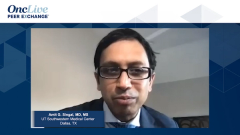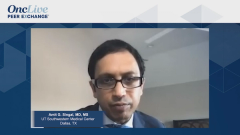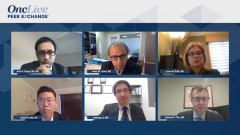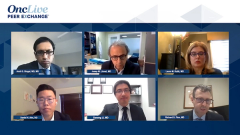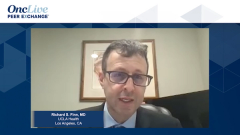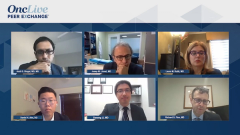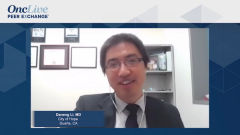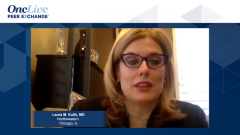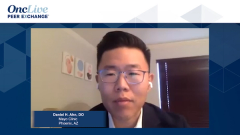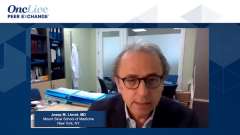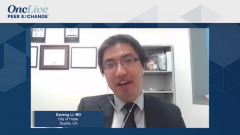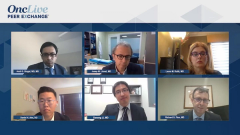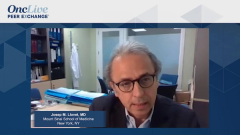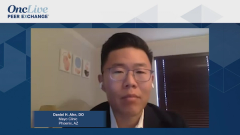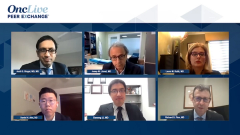
Considerations for Later Lines of Therapy in HCC Treatment
Experts in the field of HCC consider second and third lines of therapy after a patient’s disease state progresses after frontline atezolizumab-bevacizumab.
Episodes in this series

Richard S. Finn, MD: Things have changed quickly. All the data generated with other drugs was done prior to atezolizumab-bevacizumab. Similarly, when lenvatinib was approved, all the data generated with the currently approved second-line drugs were not generated in the era of lenvatinib. I don’t think that means we throw these data away. We’ve shown that these drugs are active antiliver cancer agents, and we’ll talk a little about how we sequence that.
Dan, at ASCO GI [American Society for Clinical Oncology Gastrointestinal Cancers Symposium] there were some data presented about what happens after atezolizumab-bevacizumab in practice. Can you comment on that data and what you do in your practice after patients with advanced hepatocellular carcinoma [HCC] progress on frontline atezolizumab-bevacizumab given the high level 1 evidence data gap?
Daneng Li, MD: Now that atezolizumab-bevacizumab has moved in as the standard of care in the first-line setting, the question of what do you do after atezolizumab-bevacizumab is the 1 we struggle with the most in practice. In general, there are 2 camps: The first camp treats with prior first-line treatments such as sorafenib and lenvatinib after atezolizumab-bevacizumab; the second camp skips these first-line agents and treats with the current second line, such as cabozantinib and regorafenib.
At ASCO GI we began to answer this question in terms of looking at some retrospective studies of patients who received different TKI [tyrosine kinase] therapies after atezolizumab-bevacizumab. There was a poster presentation by Changhoon Yoo, MD, PhD, and colleagues that was presented, and they looked at 49 patients who received TKI therapy after atezolizumab-bevacizumab. Twenty-nine patients were given sorafenib, 19 patients were given lenvatinib, and 1 patient was given cabozantinib—so there were about 50 patients altogether; a very small study. Unsurprisingly, they found that 3 of 19 patients in the lenvatinib group had a partial response, whereas the sorafenib group had stable disease. Interestingly, the disease control rate was equivalent, essentially a little over 60% for both sorafenib and lenvatinib, and that 1 cabozantinib patient also had stable disease. Progression-free survival, as you would imagine, favored lenvatinib over sorafenib, with progression-free survival almost doubling in that subsequent line of treatment.
Although there was a trend in favor of lenvatinib, there was no statistical difference in terms of overall survival between lenvatinib and sorafenib.
The data are consistent with what we see of these agents in the first line to be used second-line post–atezolizumab-bevacizumab; it is a little reassuring for those in that camp. For a lot of us, we need more of this real-world data in this setting outside major clinical trials, especially with more of the broader agents comparing, let’s say, sorafenib, lenvatinib, and even cabozantinib with different mechanisms of action. Obviously, lenvatinib targets FGF1 through FGF4, and cabozantinib has effects on MET and AXL. If we can get data showing these 3 TKIs and be able to get larger numbers in the real world, it will inform us a little in terms of what we do moving forward.
Richard S. Finn, MD: That’s an important data gap, and it will take some time to fill that. It probably will come from real-world experience before we get any large-phase studies on sequencing.
Josep, for example, a patient has intermediate disease, they progress, and they started on lenvatinib prior to the approval of atezolizumab-bevacizumab. This patient then progresses from this high-risk intermediate stage to advanced stage HCC. How would you think about treating them?
Josep M. Llovet, MD: With the data that we have, I will tell you I would treat with atezolizumab-bevacizumab. You and Dan were mentioning that there are 2 different feelings whether we respect all the data we have been gathering the past 12 years with more than 20 trials or using atezolizumab-bevacizumab and seeing what happens. I am more in favor of the first strategy. We need to consider sorafenib and lenvatinib still as first- and second-line treatment options for those patients who, as we have been mentioning, have any contraindications for atezolizumab-bevacizumab. You were flip-flopping these because you were saying the patient was treated before atezolizumab-bevacizumab and now he’s progressed. But certainly I would expose this patient to atezolizumab-bevacizumab considering that this has been the best combination ever reported and this patient has not been exposed to immunotherapy alone or in combination.
Richard S. Finn, MD: Yes, give them the benefit of the doubt even though they’ve been exposed to systemic treatment. This will become an issue as some of these regimens get moved to the earlier setting.
Transcript Edited for Clarity


